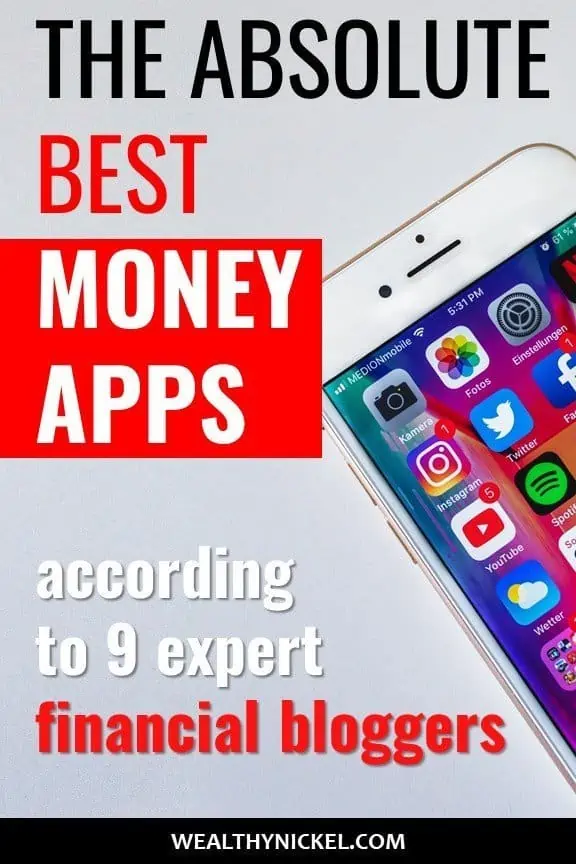The landscape of personal finance apps is constantly changing. There are so many choices it is hard to figure out which are the best money apps out there.
In my quest for the absolute best money apps, I have downloaded dozens and only a few have made the cut to stay on my phone.
I’m always looking for the next best app to try – whether it be related to budgeting, investing, or making money. So I reached out to several expert financial bloggers to bring you the best of the best.
I asked them to give me their absolute favorite money app that they personally use, and they didn’t disappoint. Here are their recommendations of the best money apps out there!
Best Money Apps for Budgeting and Money Management
1. Personal Capital
One of my favorite apps is Personal Capital. It is similar to Mint in that it helps your import your bank transactions and keep track of your budget. But it has many more powerful tools to help you manage your investments and track your net worth, all in one easy place.
>>>Try Personal Capital today! Get a $20 bonus when you sign up through this link!
It is also a favorite of a lot of the financial blogging experts I reached out to. Here is what they had to say:
Dr. Breathe Easy at Dr. Breathe Easy Finance
Personal capital hands down. I am not even an affiliate, so this would be my honest opinion.
This is an investment tracking and budgeting tool in one package. As a budgeting tool, it automates the entire budgeting process. It gives a breakdown of all your income and expenses. To get this breakdown, you would of course have to sync all of your accounts to the platform first before this can be possible.
The process was pain free for me and was well worth the exercise.
It can also show you a projection on what your future look like, if you continue in the current trajectory of spending. For investment, after inputting all your investment accounts, it can now aggregate the data and tell you how much you have and if this would be enough for retirement. It updates automatically as you pay off debt or invest more.
The most important function for me is the net worth calculations. It felt good watching our net worth cross the zero mark after paying off over $200,000 of student loan debt as quickly as possible.
The caveat to this is that it has a free version and a paid version. They tend to try and entice you to get the paid version. However the free version is more than enough for your regular needs.
Todd at Invested Wallet
I started looking into my personal finances in Summer 2014 and until 2017 I never used a money app.
GASP! I know, someone who is into personal finances and investing did not use something to help organize or manage their finances?
There are two reasons for this. First, I was so wrapped up in learning, reading, and trying to understand finances and investing, that I didn’t even bother to research any apps. Second, when I first was putting numbers together and a simple budget, I reverted to good ol’ spreadsheets with basic formula functions. You might consider a money app, but I didn’t compare to what was out there.
That said, in 2017 I did sign up for one, and it was Personal Capital. Probably the most popular among the personal finance space, but one I also wish I knew about sooner. It’s key to helping me see how my net worth is growing and how much I spent versus previous years. I’ve never been one to obsess much over these apps, but Personal Capital is one that is quite helpful to know and utilize. Plus, it’s free! Win-win.
2. Credit Karma
Credit Karma is one of my all time favorite apps. It keeps track of my credit score and the information being reported to the credit bureaus, and alerts me when anything changes.
Like it or not, your credit score is one of the most important things that banks, landlords, and other creditors look at to determine your ability to buy a house, car, or even open a credit card. Making sure you keep an eye on your score is incredibly important in the modern world!
Credit Karma also ranks high for one of my fellow financial experts, here’s what he had to say.
Camilo from The Finance Twins
Our favorite money app is CreditKarma! We first began using it in the winter of 2007 as freshmen in college so that we could track and monitor our credit.
Growing up poor, we didn’t have anyone to fall back on financially so the first thing we did when we turned 18 was start to establish credit. We knew our mom wouldn’t qualify as a co-signer if we ever needed one for anything so we sought to establish credit as early as we could. Credit Karma allowed us to check our credit reports and credit scores for free during a time when it normally cost anywhere from $10 to $30 to check your credit score.
It allowed us to test the impact of different credit choices and see the results quickly. Is it bad to close a credit card? We were able to see the impact ourselves. Pretty neat.
Today, there are many alternatives to CreditKarma, but we still use it because of it’s simplicity. You do need to be aware (and wary) of the many offers for credit cards and loans since opening new credit accounts can be a slippery slope, and stick strictly to the credit report and credit score capabilities of the app. But if you are looking for a way to stay on top of your credit and get notifications if there are any changes to your credit report, CreditKarma is tough to beat.
3. Mobile Banking Apps
Most banks these days have good apps to help you keep track of your account balances, deposit checks, and transfer money. I use USAA for most of my banking and I LOVE their app. They were one of the first banks to adopt an online-only mentality and tend to stay ahead of the curve on features.
Here’s what another blogger had to say about his love affair with mobile banking apps (and Excel – if you can’t tell yet, financial bloggers tend to be a bunch of spreadsheet nerds, myself included).
Robert Gale at Real Money Robert
I’m a little bit old school when it comes to managing my money via apps, so my answer might be a little different than your typical millennial. My answer is also a little twofold.
I use Microsoft Excel to manage pretty much everything to do with my finances. I love having the ability to set up formulas and customize things however I like. I’m also kind of an Excel junkie, so take that into consideration as well.
I also love my bank’s mobile app as they have a ton of features, including mobile deposit, which is very handy because I’d rather not set foot in my bank.
I do all of my banking and finances online, so having to go into the bank to cash a check would be very inconvenient! I have 5 kids! Ain’t nobody got time for that! They also have spending trackers, which makes categorizing my budget a breeze!
Best Money Apps for Saving Money
1. Trim
Trim is an app that I recently discovered that is actually a bot that resides within Facebook (so no extra app to download – score!) It makes my introverted heart happy because it will negotiation your cable bill and other subscription bills for you and alert you when it has saved you money. I’m all for automatic savings.
>>>Click here to see if Trim can save you money on your bills!
Melissa also found this app useful in her own life, here’s what she had to say.
Melissa Blevins at Perfection Hangover
Trim is an app I recently learned about that can help you save money by renegotiating your bills.
For example, if you have internet services through Comcast, you can upload a bill and Trim negotiates discounts on your behalf, saving you money! Trim will also work with cell phone providers to lower your service payments!
2. Ebates
Ebates is one of my personal favorite money saving apps. There are a million money saving and money making apps out there, and trying to sort through which are worth your time can be a real chore.
My criteria for a good money saving app is that it has to be almost completely passive. I don’t want to have to click through the app and look for deals or coupons or do this or that to make extra money.
That is what I love about Ebates. It gives me cash back on almost every online purchase I make (even on Amazon!) Ebates has negotiated deals with almost every major retailer, and you can usually get anywhere from 2-10% cash back.
There is a super simple Google Chrome extension you can install so that when you are shopping online, it will pop-up and remind you how much cash back Ebates offers for that site. If you click the pop-up, it will automatically apply your cash back to the transaction making the process seamless.
Here’s a recent example from just a few days ago:
I’ve been needing a new sweater for awhile now as my favorite one got a hole in it (which my wife keeps reminding me about). I was browsing on Banana Republic, and the Ebates extension alerted me that I could get 8% cash back at Banana Republic. They were also having a 40% off sale at the time, so I ended up getting my sweater for 48% off!
>>>Get a $10 sign-up bonus and cash back on every online purchase now with Ebates!
Best Money Apps for Investing
1. M1 Finance
M1 Finance is app I had heard about, but didn’t know much about. So I was excited when one of my favorite financial bloggers picked it as his favorite app. If you have any interest in individual stock investing, but hate the high transaction fees, this app may be a good fit! Here’s what Jarek has to say about it.
Jarek at Time in the Market
I’m a long term index investor at heart. The majority of my money is in simple low cost index funds.
However, I do have some individual holdings and a tendency to want to try some new strategies with those holdings. This small % of my overall holdings has generally been limited by the cost of implementing those strategies and the fact that it’s hard to buy multiple companies if your starting point is small.
That’s why I fell in love with M1Finance when it came out. M1Finance is a trading platform that allows you to create investing pies and invest your money in accordance with those Pies. I talked about it in detail in my M1Finance review, but in essence, pies are simply portfolios you create that can include as many stocks or ETFs as you want.
I’ve had a lot of fun creating and purchasing stocks in areas I want to invest in but didn’t in the past because of the cost of investing in multiple stocks. With M1Finance, I can create a pie for anything I can think of and buy 50+ stocks at once with no transaction costs.
For example, I have a pie for all the Dividend Aristocrats and each week, I put $100 into that account which is split equally among the 57 stocks in that pie. I also have some pies in a high risk/high reward portfolio. These include things such as a pie for video games, a pie for FinTech and even a pie for space technology!
It’s an awesome and free way to get exposure to stocks you wouldn’t buy otherwise because of cost limitations or lack of diversification. I think of it as creating my own ETFs and while it’s far from my #1 broker, I have a decent amount of money in there already and plan to put in more.
My strategy will always revolve around index funds for the majority of my money but if I want to try something interesting with a small portion of my holdings, M1Finance is the perfect place for that.
2. Betterment
If you are new to investing or scared you don’t know what you’re doing, a “robo-adviser” like Betterment can be a great way to get started. With low fees (currently around 0.25%), Betterment will help you design a portfolio that works for your situation – life stage, risk tolerance, investment objectives, etc.
While you could save a little more money going the do-it-yourself route and picking your own stocks and index funds, Betterment is a great alternative if you want a more hands-off approach. I know several financial bloggers that personally use it and recommend it. Here’s what Riley had to say about Betterment.
Riley at Young and the Invested
My favorite money app is Betterment. The service tracks all of my external accounts in one convenient location and also provides automation services for my investments held on the platform.
Betterment provides automation and asset allocation tailored to your unique investment goals. If I am planning to purchase a house in the next two years and want to hold more conservative investments, Betterment automatically builds a portfolio comprised primarily of bond and stock ETFs with a more risk-averse portfolio.
Over time, the portfolio transitions to be completely bond-focused without prompting on my part to initiate the move. The service relies on scientific research to provide the optimum portfolio allocation to meet your investing objectives.
It has become my go-to source for managing my IRA, after-tax, and house down payment investments.
Best App for Bloggers
Symposium
While not a traditional personal finance app, if you are a blogger or content creator, Symposium is a great platform to create and share your content and experience with others. This is an app that one blogger who is also a financial adviser has been using to reach a wider audience than he could one-on-one. Here’s what he had to say.
Michael at Wealth of Geeks
My favorite app is Symposium, it’s a online marketplace where users can marketplace their experience. The app is perfect for people looking to launch a low cost side hustle or ways to make money fast.
Signing up for the app only takes a second using one of your social media profiles, or an email and password. Once you have logged into the app you can create a pay-per-view presentation.
The app allows for one-to-one presentations suitable for those looking to offer coaching, counseling or support such as, fitness coaches, tech support, life coaches, etc. The app also allows one-to-many presentations similar to a webinar, or live streaming event. This option would be suitable for bloggers, podcasters, you-tubers, and streamers looking to offer a live pay-per-view presentation.
Setting up a listing only takes a few minutes, and it’s an excellent app for anyone looking to launch a side business monetized with a much smaller audience than the more traditional and crowded platforms such as blogging or YouTube.
What Is Your Best Money App?
Thanks to all the financial bloggers that contributing their favorite money apps!
This post only scratched the surface of all the apps out there that could make your financial life easier. Depending on your life stage and situation, you may find some apps work better for you than others. But if you’ve never explored all the possibilities out there, I hope this gave you a good overview of a few money apps to take a look at.
What is your favorite money app and why? Let me know in the comments!
Andrew Herrig is a finance expert and money nerd and the founder of Wealthy Nickel, where he writes about personal finance, side hustles, and entrepreneurship. As an avid real estate investor and owner of multiple businesses, he has a passion for helping others build wealth and shares his own family’s journey on his blog.
Andrew holds a Masters of Science in Economics from the University of Texas at Dallas and a Bachelors of Science in Electrical Engineering from Texas A&M University. He has worked as a financial analyst and accountant in many aspects of the financial world.
Andrew’s expert financial advice has been featured on CNBC, Entrepreneur, Fox News, GOBankingRates, MSN, and more.


